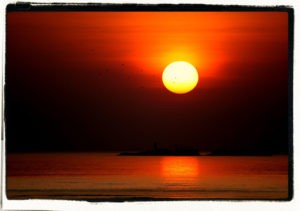This is the seventh part in The Stutterer, a fiction series by the author. Installments run on Sunday mornings. You can find the first six parts here.
 Moses noticed the color first. Before the stench of the dead fish filled his nostrils, and before he heard the voices buzzing in his ear, he noticed the color of the water. The river had turned a sorrowful, crimson red that paralyzed his eyes and drained his heart. Then the fish rose to the surface and seeped into every home, making the whole city smell like the inside of a grave.
Moses noticed the color first. Before the stench of the dead fish filled his nostrils, and before he heard the voices buzzing in his ear, he noticed the color of the water. The river had turned a sorrowful, crimson red that paralyzed his eyes and drained his heart. Then the fish rose to the surface and seeped into every home, making the whole city smell like the inside of a grave.
Moses had hoped that this one act of God would be enough—that Rameses, without water, facing God’s blunt wrath, would bend and weaken and free the Israelites from their captivity. But the Pharaoh’s heart was not that soft. He summed his best alchemists, and before Moses’s eyes they turned a pot of clear palace water into a defiant red. Seeing this Rameses laughed like he used to do when the two were younger and raced around the palace. Like those innocent days Rameses thought he had won again, but Moses knew the race was just beginning. Moses knew that what was in that pot was not blood, but it didn’t matter; Rameses had already made his decision: it would take more than blood to open his heart.
Meanwhile the city didn’t have clean water. Aaron and his friends believed in Moses and believed in God, but most of the Israelites were too young to know of Moses, or had otherwise forgotten his story and the dream of the old Pharaoh. They wanted to be free, but freedom to them was an abstract concept, a dream of their parents and grandparents that had grown old and feeble like dry trees. But for Aaron it was real. And for Moses it was vital. He had not been chosen at random, there had to be a reason for choosing an already free man—a free man with a fickle tongue—to lead the fight for freedom. So at Moses’s request Aaron called together the leading men and women of the community, to remind them of the hope that once was.
“After generations of slavery,” Aaron said to the hundreds gathered, “It’s easy to forget that we once were free. It’s easy to forget what that word, Freedom, actually means. But we’re so close now, closer than we have ever been. Our parents and grandparents used to dream about us. When they birthed more children into this terrible affliction they had hope in their hearts that one day their children would be free, that one day they would taste freedom. Well,” he said, “Can you taste it?”
He looked at Moses, eyes meeting eyes; hearts saying what words could not. “We have all witnessed a miracle,” Moses said. “God turned an entire river into blood. We have not been forgotten.”
The crowd erupted in applause. Red hands shot skyward and faces tilted towards the heavens as if expecting a sign—something, anything, that would confirm what Moses had said. But nothing came. Moses, sensing the shuffling feet and worried eyes looked nervously at Aaron. “Brothers,” Aaron said over the din. “Sisters. The time for doubting is over. The time for wondering is over. The time for asking in vain for a sign is over. You’ve had your sign. God doesn’t free a person; he frees a people. He just turned a river into blood, and he won’t rest until we all are free!”
Satisfied, the crowd went home. The blood washed away, and the stench rescinded; yet the Jews were still slaves.
“What’s next?” Moses asked his brother. They were sitting at the edge of the river. In the distance, the Red Sea underlined the mountains on the edge of the earth.
“Next is freedom,” said Aaron.
“I mean before that. God turned the entire water system of Egypt into blood and Rameses barely blinked. What’s next?”
“Does it matter?”
“People will endure a few days of bloody water, Brother. They’ll endure a blight on their food supply, inclement weather, and maybe even more. But there’s a limit to all this. Yes the people want freedom, but there’s a limit.”
“We’ve been waiting a long time for this,” Aaron said. “The people are stronger than you think.”
They sat for a while and gazed at the water. Moses believed his brother but still had doubts. Were the people prepared to lose their lives for this? Was he? He definitely believed in God—he could have imagined a burning bush, and he could’ve Moses knew his stepbrother—Rameses once ran the second half of a race on a broken imagined the blood, but the whole city saw that too. Yet he wondered if God had a plan, or if this disembodied voice was improvising just like Moses. What kind of magic could God perform that the Pharaoh’s alchemists could not? God had allowed his creation to degenerate into madness and immorality before; Moses remembered the stories of Sodom and Gomorrah, and of Noah. God had shown he was capable of killing—by flood, by fire, or by other means—when he started to lose patience. Well, Moses knew Rameses. His stepbrother had once run half a race on a broken foot, just so nobody could say he gave up.
Just then Moses heard someone say, “Watch your step.” And before he could find the source, thousands of frogs poured out of the river and up towards the city. Moses had his answer.
(Photo: Akash_Kurdekar)

